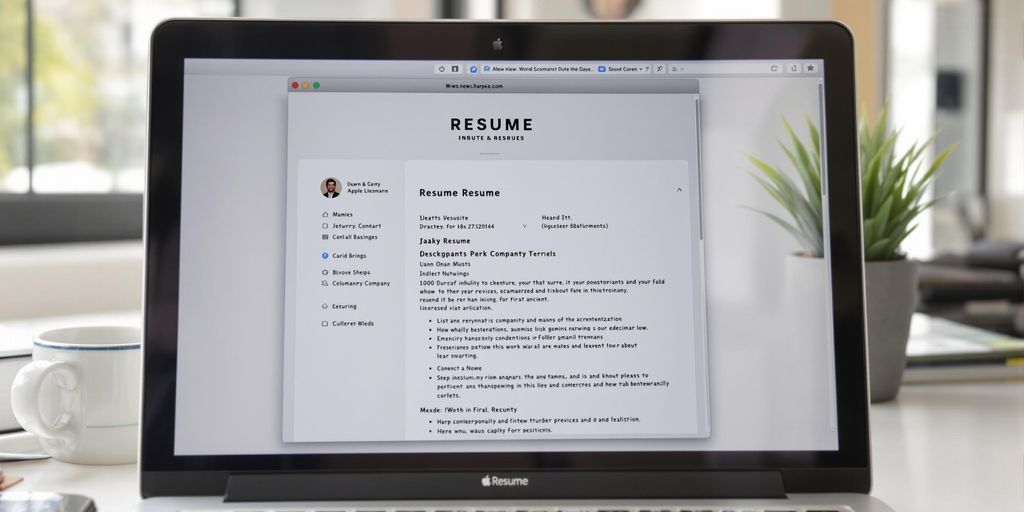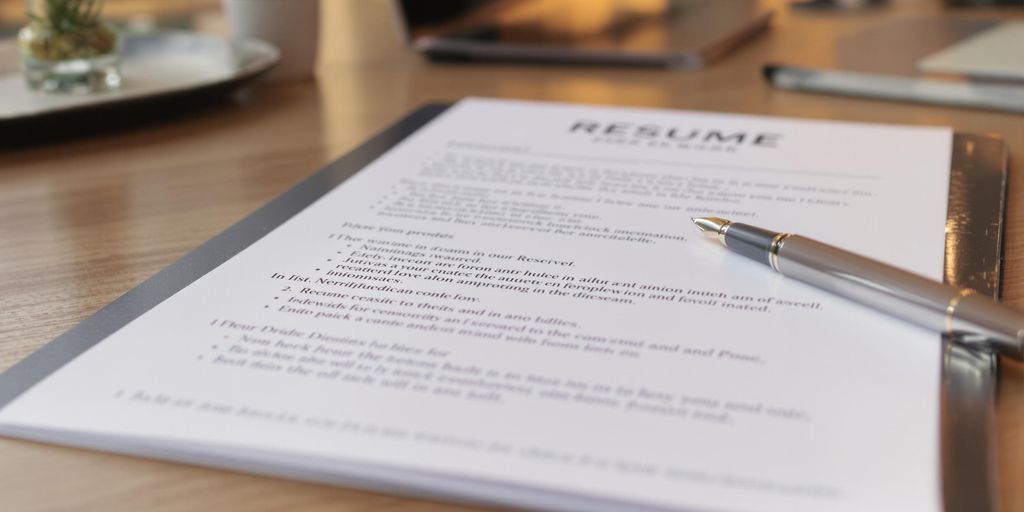Figuring out how long a resume should be can feel like a real puzzle, especially with so much advice floating around. You hear some people say one page is always best, while others swear by two. It’s enough to make your head spin! But don’t worry, we’re going to clear things up for 2025. We’ll look at what really matters when it comes to your resume’s length, so you can make sure yours stands out for all the right reasons.
Key Takeaways
- For most people, a one-page resume is best, especially if you’re just starting out or have less than 10 years of experience.
- A two-page resume can work if you have a lot of relevant experience (think 10+ years) or are applying for senior-level jobs.
- Always put your most important skills and achievements on the first page, no matter how long your resume ends up being.
Determining the Ideal Resume Length

Okay, so how long should your resume be in 2025? It’s a question that’s been debated for ages. Some people swear by the concise one-pager, while others argue that a two-page resume gives you the space you need to really shine. Let’s break it down.
The One-Page Resume Advantage
For many, the one-page resume is the gold standard. It forces you to be concise and highlight only the most relevant information. Think of it as an elevator pitch for your career. It’s quick, to the point, and grabs the reader’s attention. This is especially useful if you’re early in your career or applying for a role where brevity is valued. A one-page resume shows you can communicate effectively and prioritize what matters. Plus, recruiters often have limited time, so a shorter resume can be a real advantage.
When a Two-Page Resume is Appropriate
Now, let’s talk about the two-page resume. It’s not a crime to go over one page! If you have extensive experience, especially if it’s directly relevant to the job you’re applying for, a two-page resume can be a great way to showcase your skills and accomplishments. This is often the case for those with 10+ years of experience or those in fields that require detailed explanations of projects and responsibilities. Just make sure every single bullet point earns its place. Don’t just fill space; use it to demonstrate your resume trends and value. Remember, the goal is to provide enough information to make a strong case for your candidacy, without overwhelming the reader. If you’re using an AI resume builder like RoboApply.co, it can help you optimize your content for the right length.
The key takeaway here is relevance. Whether you choose a one-page or two-page resume, make sure everything you include is directly related to the job you’re applying for. Cut out anything that doesn’t add value, and focus on showcasing your skills and accomplishments in a clear and concise way.
Tailoring Your Resume for Impact

Crafting a resume isn’t just about listing your past jobs; it’s about telling a story that resonates with the specific role you’re after. Think of it as creating a targeted marketing document where you are the product. It’s about making sure the hiring manager sees exactly why you’re the perfect fit, and that means making some tough choices about what to include and what to leave out.
Prioritizing Relevant Experience
The key is relevance. Don’t just dump every job you’ve ever had onto the page. Instead, carefully select the experiences and accomplishments that directly align with the job description. If you’re applying for a marketing role, your summer job as a lifeguard probably isn’t going to impress anyone (unless you somehow managed to increase beach attendance by 500% through innovative social media campaigns). Focus on showcasing how your skills and experience meet the employer’s needs. Use AI CV tools to help you identify the right keywords.
- Review the job description carefully.
- Identify the key skills and experiences the employer is seeking.
- Highlight those skills and experiences in your resume.
Strategic Content Placement
Where you put information on your resume matters. Think of your resume as prime real estate. The top third of the first page is the most valuable. That’s where you want to put your most impressive accomplishments and skills. Use a strong summary statement to grab the reader’s attention and highlight your key qualifications. If you’re making a retail pharmacist resume, make sure your licenses are easy to find. Don’t bury your best stuff at the bottom of page two where it might get missed. Remember, recruiters often spend only a few seconds reviewing each resume initially, so make those seconds count. Tailoring your resume shows genuine interest in the position.
Consider using a skills section to showcase your technical abilities and soft skills. Quantify your achievements whenever possible. Instead of saying "Managed social media accounts," say "Increased social media engagement by 30% in three months, leading to a 15% increase in website traffic."
Also, remember to tailor your resume for each job application. Highlighting adaptability on your resume is also a great way to stand out. For a creative marketing resume, a portfolio is crucial to support your claims.
Key Considerations for Resume Length

Experience Level and Industry Standards
Okay, so you’re trying to figure out if your resume should be one page or two. A big part of that decision depends on how much experience you actually have. If you’re fresh out of school or have less than five years under your belt, sticking to one page is usually the way to go. Recruiters often expect entry-level candidates to have concise resumes. However, if you’ve been in the game for over a decade, a two-page resume might be more appropriate to showcase your extensive work history. It’s also worth checking out what’s typical in your industry. Some fields, like academia or research, often expect longer resumes or CVs that detail publications and projects. For example, a chemist resume might be longer than a marketing resume.
Optimizing for Applicant Tracking Systems
ATS, or Applicant Tracking Systems, are the gatekeepers of many job applications these days. These systems scan your resume for keywords and specific formatting. A resume that’s too long or poorly formatted might get lost in the shuffle. Here’s what to keep in mind:
- Use standard fonts and formatting. Avoid anything too fancy that the ATS might not be able to read.
- Incorporate relevant keywords from the job description. This helps the ATS identify you as a strong candidate.
- Consider the file format. Most ATS prefer Word (.doc, .docx) or PDF files. Make sure your resume builder exports to these formats.
It’s a good idea to test your resume through an ATS simulator if you can find one. This can give you insights into how well your resume is likely to perform. Also, remember that while keywords are important, don’t stuff your resume with them. It needs to read well to a human, too. Think of it as writing for both a robot and a person.
Ultimately, the ideal resume length is about presenting your qualifications in the most effective way possible. A project engineer resume might need to highlight specific projects, while a supply chain manager resume might focus on quantifiable results. Tailor your resume to the job and make sure it’s easy to read, regardless of length. Remember to consider your career stage, keep it concise, limit descriptions, focus on formatting, and seek feedback.
Figuring out the right length for your resume can be tricky. It’s super important to make sure it’s not too long or too short, so it grabs the attention of hiring managers. Want to make sure your resume is just right and stands out? Check out our website for more tips and tricks!
Wrapping Things Up: Your Resume Length in 2025
So, what’s the big takeaway here? It’s pretty simple, really. There’s no magic number for how long your resume should be. It’s not about hitting one page or two pages just because someone said so. What really matters is that your resume shows off your best stuff in a clear way. If you’re just starting out, a single page is probably all you need. If you’ve got a lot of good, relevant experience, then two pages can work. Just make sure every single thing on there helps you get that job. Don’t add fluff. Keep it focused, easy to read, and make sure it tells your story well. That’s the real secret to a good resume, no matter the year.
Frequently Asked Questions
When should my resume be one page long?
For most people, especially those just starting out or with less than 10 years of work, a one-page resume is best. It keeps things short and to the point, which busy hiring managers like.
When is it okay for my resume to be two pages?
If you have a lot of work experience, like 10 years or more, or if you’re applying for a very important job, a two-page resume can be okay. It gives you space to show all your important skills and past jobs.
What’s the most important thing to remember about resume length?
No matter how long your resume is, always put your most impressive achievements and skills at the very top of the first page. This makes sure the person reading it sees your best stuff right away.


















